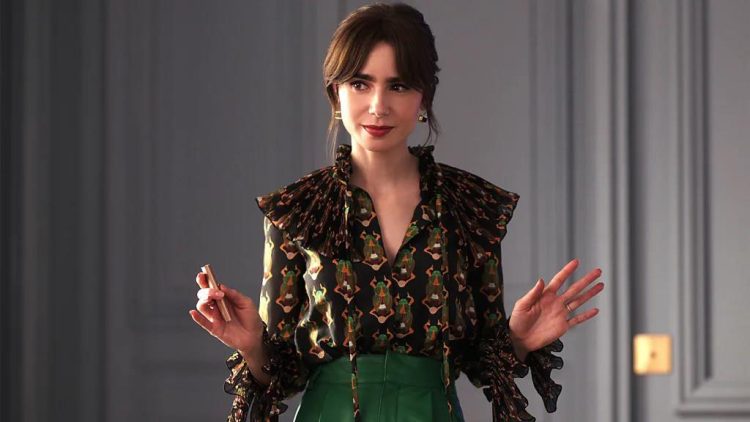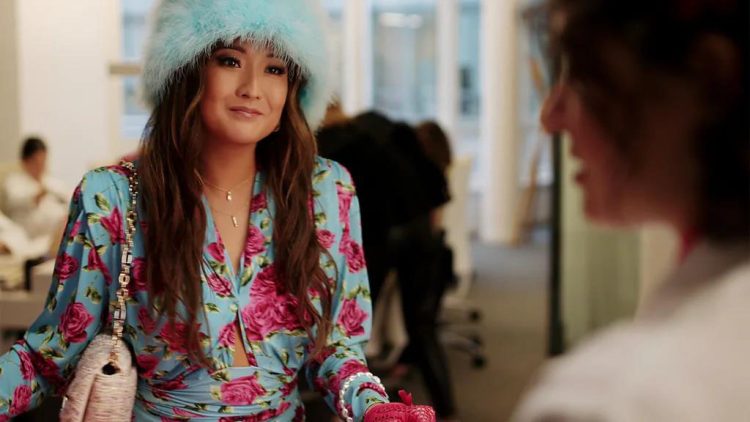(BBC) The new season of fluffy Netflix show Emily in Paris introduces a surprising plotline about sexual misconduct in the fashion world – how does the show handle the subject, and does it reflect reality?
Created by Darren Star, the featherlight Netflix series Emily in Paris unsurprisingly has plenty in common with Star’s earlier iconic show Sex and the City. From the annoying protagonist, to the obsession with the City of Light, to the fashion – SATC costume designer Patricia Field worked on the first two seasons of Emily – the two shows share many of the same themes. And this season, Emily in Paris takes another page out from its forebear, as it addresses sexual harassment in the fashion world.
This article contains mentions of sexual harassment and assault, and features spoilers for season four part one of Emily in Paris.
Many years before either Emily in Paris or, indeed, the #MeToo movement, SATC protagonist Carrie Bradshaw was sexually harassed at the Vogue HQ. The 2002 season four episode of Sex and the City saw the columnist and shoe aficionado ascend to the famous fashion closet in Vogue’s hallowed halls, where she stumbled upon the much-coveted supposed “urban shoe myth” – Manolo Blahnik Mary Janes. While there, she also stumbled upon her supposed mentor, Julian (Ron Rifkin), in his underwear, calling her adorable while suggestively snapping the band of some Versace briefs he just happened to be trying on. “You’re old enough to be my father,” she gasps, while Julian retorts with a dig about her having issues with men. “Show some respect. This is Vogue”, Carrie says dismissively, toeing the line in her Mary Jane pumps between calling Julian out, wanting to preserve her position at Vogue,and preventing further abuse.
This 2002 episode aired long before the popularisation of the #MeToo movement, but now, a similar scene occurs in the fourth season of Emily in Paris, which dropped its first batch of five episodes last week, with the second instalment set to air on 12 September. It’s notable because while there have been a few documentaries made in recent years that have highlighted allegations of sexual misconduct in the fashion industry – such as Scouting for Girls, Victoria’s Secret: Angels & Demons and White Hot: The Rise & Fall of Abercrombie & Fitch – there has been surprisingly little in the way of mainstream fictional representations.
If you’re not one of the 58 million households who streamed the fluffy series when it first dropped in 2020, here’s a quick rundown: the titular Emily Cooper (Lily Collins) is transferred from Chicago to French marketing firm Savoir after her boss, who was supposed take the job, discovers she’s pregnant. Emily isn’t prepared for this opportunity in the slightest, and the fact that she doesn’t know French, coupled with her chipper, workaholic US attitude immediately riles her laissez-faire French colleagues, including head of Savoir, the chic, intimidating Sylvie (Philippine Leroy-Beaulieu), and her underlings, Julien (Samuel Arnold) and Luc (Bruno Gouery).
Things aren’t much better for Emily at home, either, as she becomes embroiled in a love triangle with her neighbour, Gabriel (Lucas Bravo), and her new friend Camille (Camille Razat), Gabriel’s ex. Emily’s saving grace is fellow fish out of water, Mindy (Ashley Park), an Asian-American heiress and aspiring singer.
In the four seasons since, Emily has managed to bring her icy colleagues around to her through sheer determination – though that apparently hasn’t included becoming fluent in their mother tongue nor a raise necessitating moving out of Mindy’s studio apartment. Or maybe Emily just spent it on clothes…
Now, in the new series, in a scene reminiscent of Carrie’s fashion-closet experience, Mindy is delighted to be allowed to rifle through the workplace wardrobe of luxury fashion conglomerate, JVMA, which is owned by her fiancé Nicolas de Léon’s father Louis de Léon. When two female employees encounter her trying on various archival outfits, they admonish Mindy – but not for the reason she thinks. “You need a buddy”, one of them tells her, with Mindy initially mistaking this as an offer for someone to carry her haul.
Later, relaying the information to Emily, Mindy is informed that the buddy system was created by JVMA’s female employees because Louis insists they try on the clothes they’ve picked out in front of him. If they don’t, they’re deemed fashion philistines, and can therefore never climb up the ladder in the company. It is, in other words, a fashion version of the casting couch.
• The ultra girly movement sparking debate
Earlier in her career, Emily’s boss Sylvie had worked at JVMA, and season three had alluded to an inappropriate incident between Sylvie and Louis when she had been working for him. In the new series, when Emily finds out that Savoir is planning on working with Louis, she raises her concerns with Sylvie, who is visibly rankled at first. “It was a different time”, she replies dismissively. However, once Sylvie finds out that Louis is still harassing his subordinates, as he had during her time at the company, she decides to speak up.
This French cultural norm around sex is the reason why the #MeToo movement has struggled to gain momentum in their fashion industry – Marian Kwei

This moment highlights what some have claimed is a generational divide between young women who want to call out their abusers and sexist treatment, and older women, though this theory has also been described as “a myth”. Arguably, this chasm is particularly pronounced in France, where #MeToo has been slower to gather pace compared to other Western countries. Fashion expert and editorial director of Story Magazine, Marian Kwei, puts this down to the country’s attitude to sex more broadly. “This French cultural norm around sex is the reason why the #MeToo movement has struggled to gain momentum in their fashion industry,” she tells the BBC. According to Agnès Poirier in The Observer: “what has always distinguished French feminism from the American and British versions [is] the attitude towards sex and towards men”.
The movement saw modest success in France in its early days, with female parliamentarians speaking out, but it largely stalled. In fact, the proportion of rape accusations dismissed in court rose from 86% pre-#MeToo in 2016, to 94% in 2020, a study by the Institute for Public Policy found. Still, some high-profile French fashion power players have been implicated, though the outcomes were mixed. French photographer Patrick Demarchelier was accused of sexual harassment by seven models in 2018, which he denied. Head of French Elite model management Gérald Marie had the cases against him closed in 2023 due to the expiration of the statute of limitations, while Jeffrey Epstein associate, model agent Jean-Luc Brunel, was imprisoned for the rape of minors in 2020, and then died by suicide.
There has been similar scepticism towards #MeToo in France’s film industry, with 100 female artists making headlines in 2018 for signing an open letter to Le Monde newspaper stating “the liberty to seduce and importune is essential to sexual freedom”. Star of Portrait of a Lady on FireAdèle Haenel led the way in 2023 by announcing she was quitting the industry over its allegiance to alleged abusers. Allegations followed against French actor Gérard Depardieu, who is set to stand trial in October over charges relating to two sexual assaults that allegedly took place in 2014 and 2021. Depardieu has denied all the allegations. And French actress Judith Godrèche has brought historical allegations against French film-makers Benoît Jacquot and Jacques Doillon, which are currently under investigation. Both men deny the allegations.
Actress and film-maker Noémie Merlant, seemingly inspired by her Portrait of a Lady On Fire co-star Haenel and has co-written, directed and stars in the French #MeToo effort, The Balconettes. And who can forget Maïmouna Doucouré’s Cuties, about the sexualisation of a girls’ dance troupe, that became the victim of the very issue it was commenting on thanks to a suggestive marketing campaign by Netflix, who later apologised.
Hollywood has been tentative in tackling the subject, too. Maureen Ryan, Vanity Fair contributor and author of Burn It Down: Power, Complicity and a Call for Change in Hollywood, characterises it as a “paucity” of #MeToo stories. “Aside from a few high profile examples,” such as I May Destroy You and Promising Young Woman, “I can’t think of that many films or programmes I could recommend and say, ‘Yeah, that captures it – the complexity and the ambiguity’”, Ryan tells the BBC.
Emily in Paris is a fantastical, light depiction of the French fashion industry, but still it’s worth noting that Sylvie ultimately decides to speak up and tell the truth about Louis de Léon in a Le onde exposé. Some might hope that real life will follow in its footsteps.
Emily in Paris Season 4 is streaming now on Netflix






